The Value of Performing Arts and Theatre Performance in Education
VerifiedAdded on 2023/04/19
|9
|2681
|207
Essay
AI Summary
This essay analyzes the value of performing arts and theatre performance in early childhood education, emphasizing their role in the cognitive and psychosocial development of children aged 0-5. It highlights how traditional teaching methods often fall short for this age group, while music, movement, and drama effectively engage children's senses and facilitate learning. Drawing upon Piaget's theory of cognitive development and Froebel's emphasis on self-activity, the essay discusses how these methods align with children's natural inclination to learn through play and sensory experiences. It also references Dalcroze Eurythmics, the Orff approach, and Gardner’s Multiple Intelligence Theory to illustrate the benefits of incorporating visual and musical elements in education. The essay further explores how dramatic enactment and sing-song methods enhance learning and self-expression, particularly for children with limited speech abilities. It concludes that these approaches offer significant advantages by catering to children's receptivity to musical sounds and dramatic performances, ultimately fostering their cognitive, emotional, and social development. Desklib provides access to more resources and solved assignments for students.
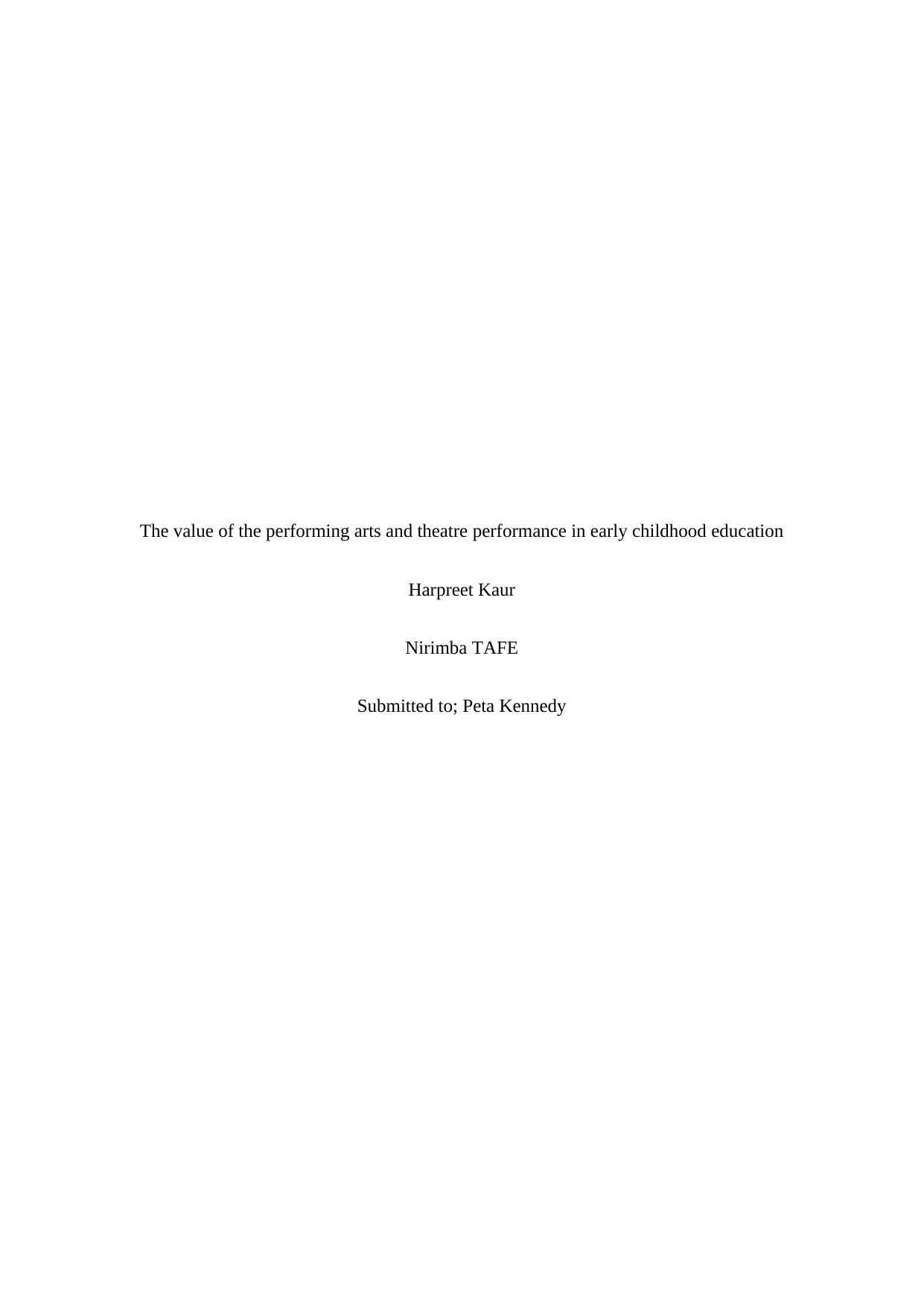
The value of the performing arts and theatre performance in early childhood education
Harpreet Kaur
Nirimba TAFE
Submitted to; Peta Kennedy
Harpreet Kaur
Nirimba TAFE
Submitted to; Peta Kennedy
Paraphrase This Document
Need a fresh take? Get an instant paraphrase of this document with our AI Paraphraser
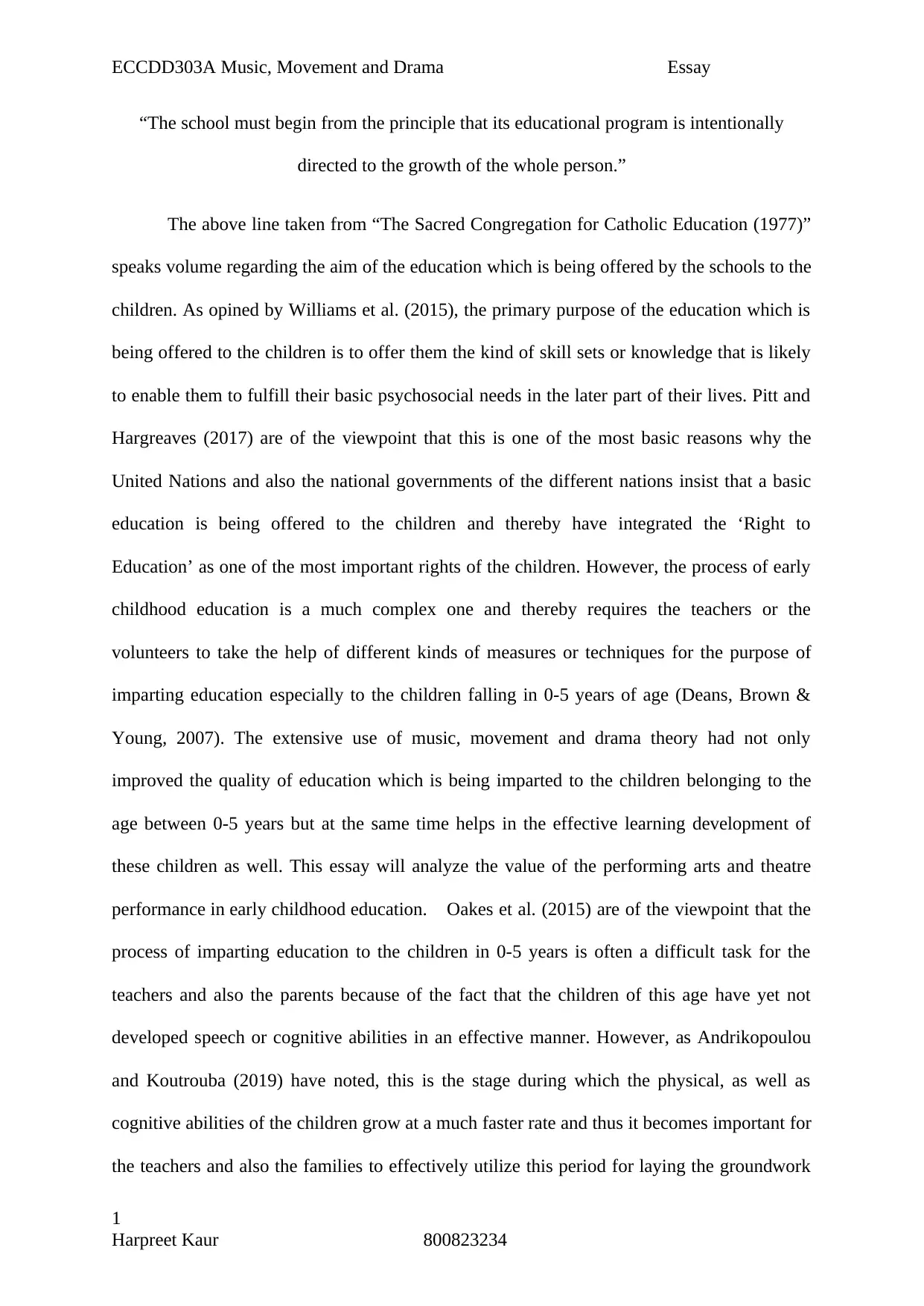
ECCDD303A Music, Movement and Drama Essay
“The school must begin from the principle that its educational program is intentionally
directed to the growth of the whole person.”
The above line taken from “The Sacred Congregation for Catholic Education (1977)”
speaks volume regarding the aim of the education which is being offered by the schools to the
children. As opined by Williams et al. (2015), the primary purpose of the education which is
being offered to the children is to offer them the kind of skill sets or knowledge that is likely
to enable them to fulfill their basic psychosocial needs in the later part of their lives. Pitt and
Hargreaves (2017) are of the viewpoint that this is one of the most basic reasons why the
United Nations and also the national governments of the different nations insist that a basic
education is being offered to the children and thereby have integrated the ‘Right to
Education’ as one of the most important rights of the children. However, the process of early
childhood education is a much complex one and thereby requires the teachers or the
volunteers to take the help of different kinds of measures or techniques for the purpose of
imparting education especially to the children falling in 0-5 years of age (Deans, Brown &
Young, 2007). The extensive use of music, movement and drama theory had not only
improved the quality of education which is being imparted to the children belonging to the
age between 0-5 years but at the same time helps in the effective learning development of
these children as well. This essay will analyze the value of the performing arts and theatre
performance in early childhood education. Oakes et al. (2015) are of the viewpoint that the
process of imparting education to the children in 0-5 years is often a difficult task for the
teachers and also the parents because of the fact that the children of this age have yet not
developed speech or cognitive abilities in an effective manner. However, as Andrikopoulou
and Koutrouba (2019) have noted, this is the stage during which the physical, as well as
cognitive abilities of the children grow at a much faster rate and thus it becomes important for
the teachers and also the families to effectively utilize this period for laying the groundwork
1
Harpreet Kaur 800823234
“The school must begin from the principle that its educational program is intentionally
directed to the growth of the whole person.”
The above line taken from “The Sacred Congregation for Catholic Education (1977)”
speaks volume regarding the aim of the education which is being offered by the schools to the
children. As opined by Williams et al. (2015), the primary purpose of the education which is
being offered to the children is to offer them the kind of skill sets or knowledge that is likely
to enable them to fulfill their basic psychosocial needs in the later part of their lives. Pitt and
Hargreaves (2017) are of the viewpoint that this is one of the most basic reasons why the
United Nations and also the national governments of the different nations insist that a basic
education is being offered to the children and thereby have integrated the ‘Right to
Education’ as one of the most important rights of the children. However, the process of early
childhood education is a much complex one and thereby requires the teachers or the
volunteers to take the help of different kinds of measures or techniques for the purpose of
imparting education especially to the children falling in 0-5 years of age (Deans, Brown &
Young, 2007). The extensive use of music, movement and drama theory had not only
improved the quality of education which is being imparted to the children belonging to the
age between 0-5 years but at the same time helps in the effective learning development of
these children as well. This essay will analyze the value of the performing arts and theatre
performance in early childhood education. Oakes et al. (2015) are of the viewpoint that the
process of imparting education to the children in 0-5 years is often a difficult task for the
teachers and also the parents because of the fact that the children of this age have yet not
developed speech or cognitive abilities in an effective manner. However, as Andrikopoulou
and Koutrouba (2019) have noted, this is the stage during which the physical, as well as
cognitive abilities of the children grow at a much faster rate and thus it becomes important for
the teachers and also the families to effectively utilize this period for laying the groundwork
1
Harpreet Kaur 800823234
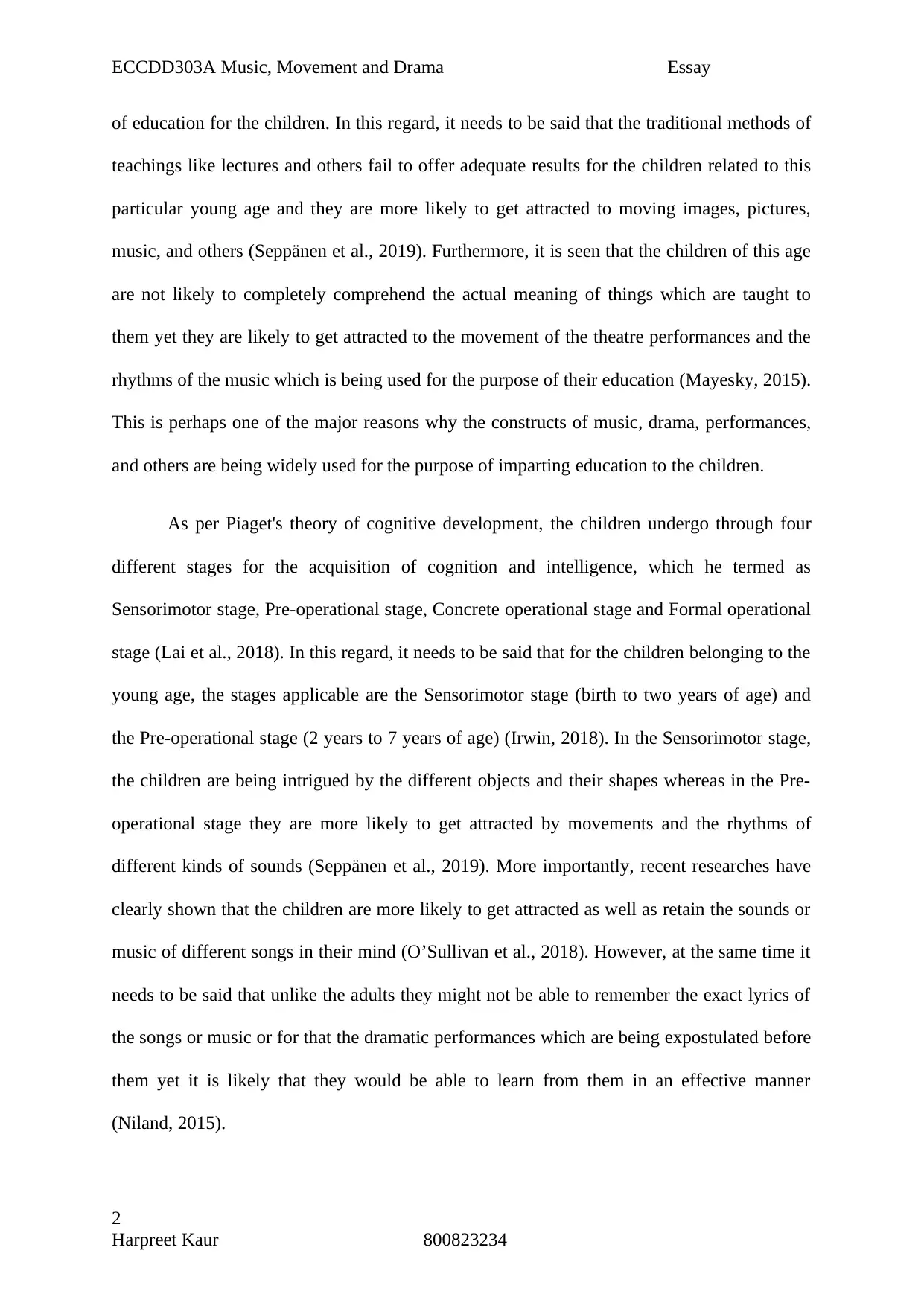
ECCDD303A Music, Movement and Drama Essay
of education for the children. In this regard, it needs to be said that the traditional methods of
teachings like lectures and others fail to offer adequate results for the children related to this
particular young age and they are more likely to get attracted to moving images, pictures,
music, and others (Seppänen et al., 2019). Furthermore, it is seen that the children of this age
are not likely to completely comprehend the actual meaning of things which are taught to
them yet they are likely to get attracted to the movement of the theatre performances and the
rhythms of the music which is being used for the purpose of their education (Mayesky, 2015).
This is perhaps one of the major reasons why the constructs of music, drama, performances,
and others are being widely used for the purpose of imparting education to the children.
As per Piaget's theory of cognitive development, the children undergo through four
different stages for the acquisition of cognition and intelligence, which he termed as
Sensorimotor stage, Pre-operational stage, Concrete operational stage and Formal operational
stage (Lai et al., 2018). In this regard, it needs to be said that for the children belonging to the
young age, the stages applicable are the Sensorimotor stage (birth to two years of age) and
the Pre-operational stage (2 years to 7 years of age) (Irwin, 2018). In the Sensorimotor stage,
the children are being intrigued by the different objects and their shapes whereas in the Pre-
operational stage they are more likely to get attracted by movements and the rhythms of
different kinds of sounds (Seppänen et al., 2019). More importantly, recent researches have
clearly shown that the children are more likely to get attracted as well as retain the sounds or
music of different songs in their mind (O’Sullivan et al., 2018). However, at the same time it
needs to be said that unlike the adults they might not be able to remember the exact lyrics of
the songs or music or for that the dramatic performances which are being expostulated before
them yet it is likely that they would be able to learn from them in an effective manner
(Niland, 2015).
2
Harpreet Kaur 800823234
of education for the children. In this regard, it needs to be said that the traditional methods of
teachings like lectures and others fail to offer adequate results for the children related to this
particular young age and they are more likely to get attracted to moving images, pictures,
music, and others (Seppänen et al., 2019). Furthermore, it is seen that the children of this age
are not likely to completely comprehend the actual meaning of things which are taught to
them yet they are likely to get attracted to the movement of the theatre performances and the
rhythms of the music which is being used for the purpose of their education (Mayesky, 2015).
This is perhaps one of the major reasons why the constructs of music, drama, performances,
and others are being widely used for the purpose of imparting education to the children.
As per Piaget's theory of cognitive development, the children undergo through four
different stages for the acquisition of cognition and intelligence, which he termed as
Sensorimotor stage, Pre-operational stage, Concrete operational stage and Formal operational
stage (Lai et al., 2018). In this regard, it needs to be said that for the children belonging to the
young age, the stages applicable are the Sensorimotor stage (birth to two years of age) and
the Pre-operational stage (2 years to 7 years of age) (Irwin, 2018). In the Sensorimotor stage,
the children are being intrigued by the different objects and their shapes whereas in the Pre-
operational stage they are more likely to get attracted by movements and the rhythms of
different kinds of sounds (Seppänen et al., 2019). More importantly, recent researches have
clearly shown that the children are more likely to get attracted as well as retain the sounds or
music of different songs in their mind (O’Sullivan et al., 2018). However, at the same time it
needs to be said that unlike the adults they might not be able to remember the exact lyrics of
the songs or music or for that the dramatic performances which are being expostulated before
them yet it is likely that they would be able to learn from them in an effective manner
(Niland, 2015).
2
Harpreet Kaur 800823234
⊘ This is a preview!⊘
Do you want full access?
Subscribe today to unlock all pages.

Trusted by 1+ million students worldwide
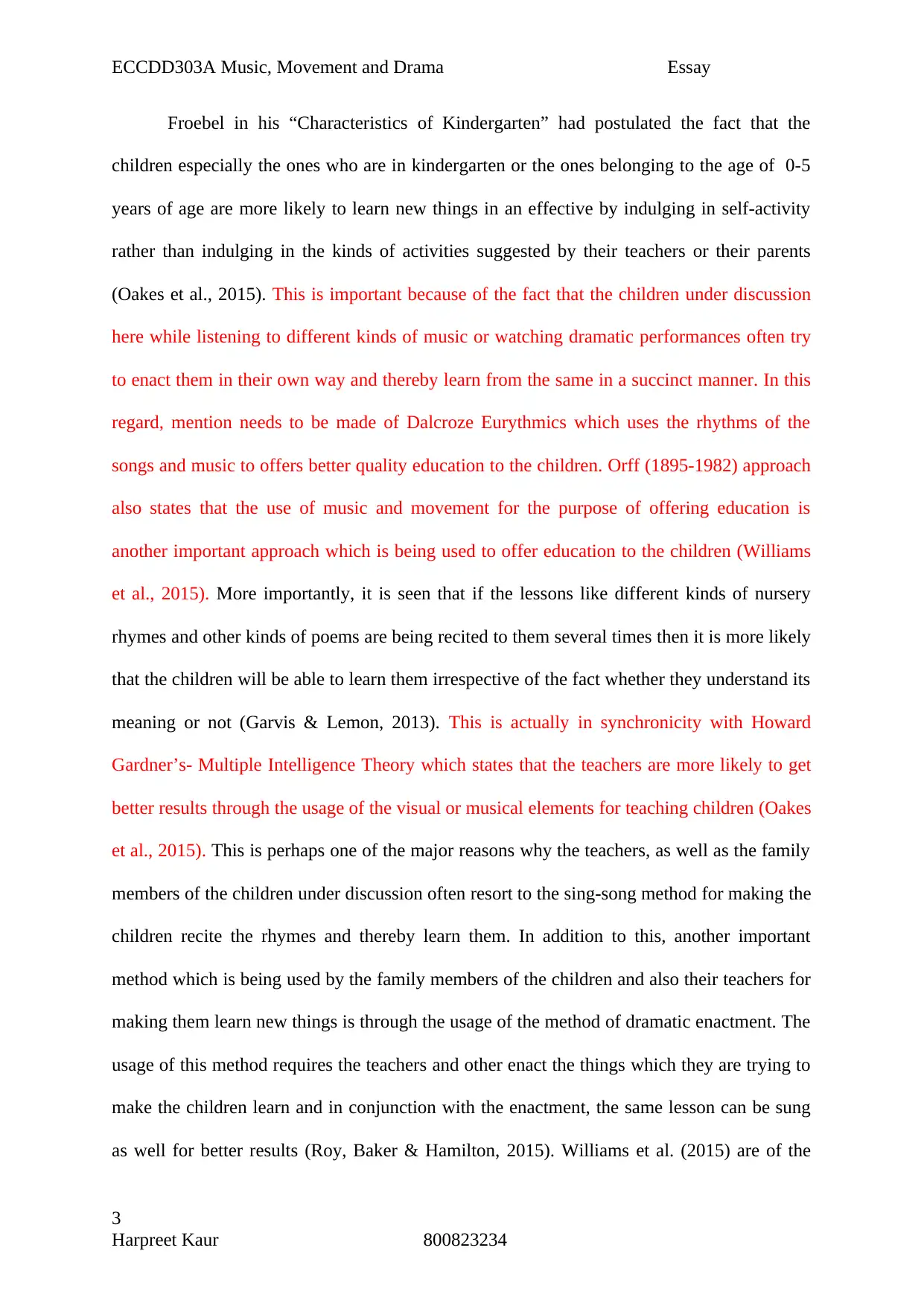
ECCDD303A Music, Movement and Drama Essay
Froebel in his “Characteristics of Kindergarten” had postulated the fact that the
children especially the ones who are in kindergarten or the ones belonging to the age of 0-5
years of age are more likely to learn new things in an effective by indulging in self-activity
rather than indulging in the kinds of activities suggested by their teachers or their parents
(Oakes et al., 2015). This is important because of the fact that the children under discussion
here while listening to different kinds of music or watching dramatic performances often try
to enact them in their own way and thereby learn from the same in a succinct manner. In this
regard, mention needs to be made of Dalcroze Eurythmics which uses the rhythms of the
songs and music to offers better quality education to the children. Orff (1895-1982) approach
also states that the use of music and movement for the purpose of offering education is
another important approach which is being used to offer education to the children (Williams
et al., 2015). More importantly, it is seen that if the lessons like different kinds of nursery
rhymes and other kinds of poems are being recited to them several times then it is more likely
that the children will be able to learn them irrespective of the fact whether they understand its
meaning or not (Garvis & Lemon, 2013). This is actually in synchronicity with Howard
Gardner’s- Multiple Intelligence Theory which states that the teachers are more likely to get
better results through the usage of the visual or musical elements for teaching children (Oakes
et al., 2015). This is perhaps one of the major reasons why the teachers, as well as the family
members of the children under discussion often resort to the sing-song method for making the
children recite the rhymes and thereby learn them. In addition to this, another important
method which is being used by the family members of the children and also their teachers for
making them learn new things is through the usage of the method of dramatic enactment. The
usage of this method requires the teachers and other enact the things which they are trying to
make the children learn and in conjunction with the enactment, the same lesson can be sung
as well for better results (Roy, Baker & Hamilton, 2015). Williams et al. (2015) are of the
3
Harpreet Kaur 800823234
Froebel in his “Characteristics of Kindergarten” had postulated the fact that the
children especially the ones who are in kindergarten or the ones belonging to the age of 0-5
years of age are more likely to learn new things in an effective by indulging in self-activity
rather than indulging in the kinds of activities suggested by their teachers or their parents
(Oakes et al., 2015). This is important because of the fact that the children under discussion
here while listening to different kinds of music or watching dramatic performances often try
to enact them in their own way and thereby learn from the same in a succinct manner. In this
regard, mention needs to be made of Dalcroze Eurythmics which uses the rhythms of the
songs and music to offers better quality education to the children. Orff (1895-1982) approach
also states that the use of music and movement for the purpose of offering education is
another important approach which is being used to offer education to the children (Williams
et al., 2015). More importantly, it is seen that if the lessons like different kinds of nursery
rhymes and other kinds of poems are being recited to them several times then it is more likely
that the children will be able to learn them irrespective of the fact whether they understand its
meaning or not (Garvis & Lemon, 2013). This is actually in synchronicity with Howard
Gardner’s- Multiple Intelligence Theory which states that the teachers are more likely to get
better results through the usage of the visual or musical elements for teaching children (Oakes
et al., 2015). This is perhaps one of the major reasons why the teachers, as well as the family
members of the children under discussion often resort to the sing-song method for making the
children recite the rhymes and thereby learn them. In addition to this, another important
method which is being used by the family members of the children and also their teachers for
making them learn new things is through the usage of the method of dramatic enactment. The
usage of this method requires the teachers and other enact the things which they are trying to
make the children learn and in conjunction with the enactment, the same lesson can be sung
as well for better results (Roy, Baker & Hamilton, 2015). Williams et al. (2015) are of the
3
Harpreet Kaur 800823234
Paraphrase This Document
Need a fresh take? Get an instant paraphrase of this document with our AI Paraphraser
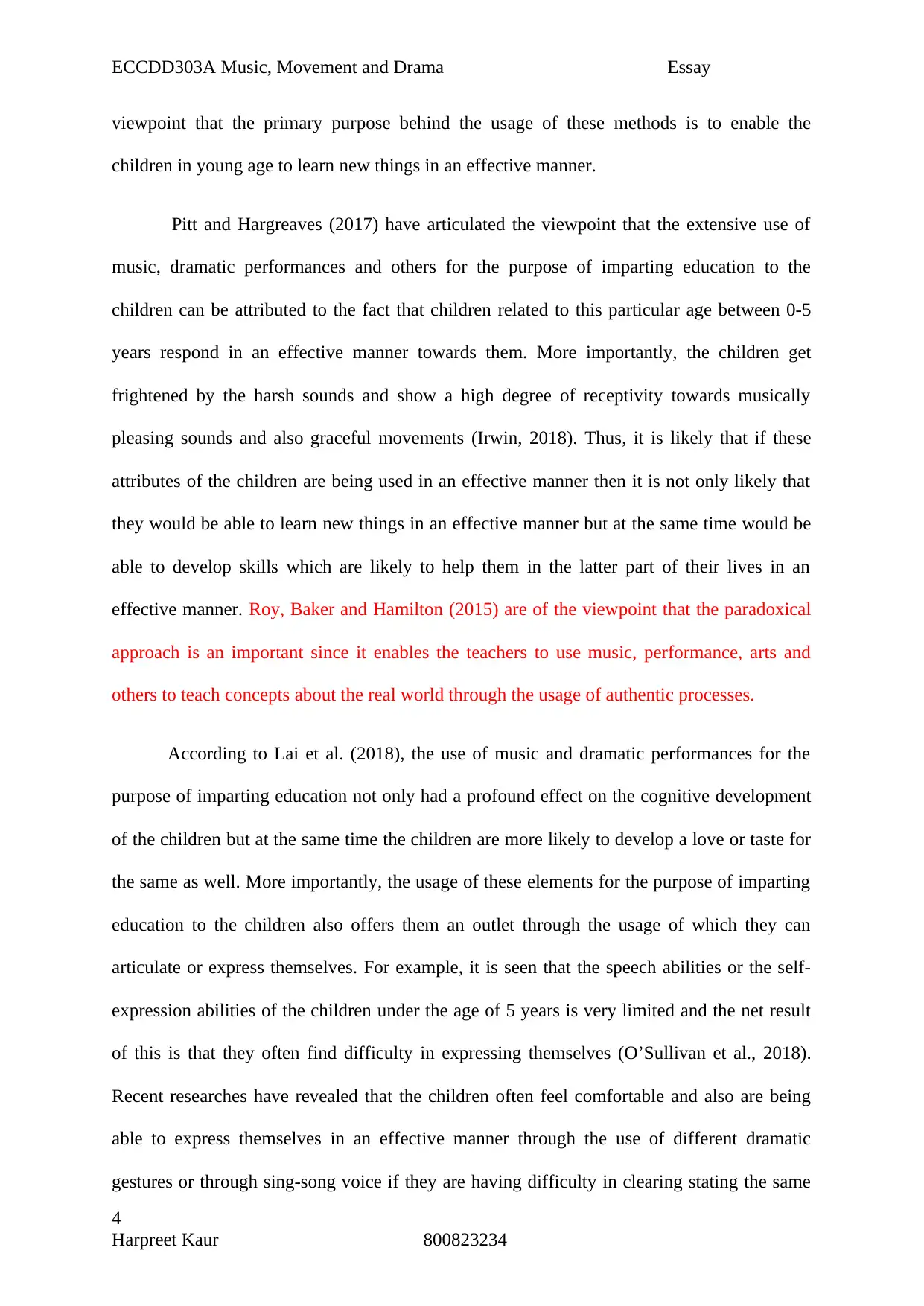
ECCDD303A Music, Movement and Drama Essay
viewpoint that the primary purpose behind the usage of these methods is to enable the
children in young age to learn new things in an effective manner.
Pitt and Hargreaves (2017) have articulated the viewpoint that the extensive use of
music, dramatic performances and others for the purpose of imparting education to the
children can be attributed to the fact that children related to this particular age between 0-5
years respond in an effective manner towards them. More importantly, the children get
frightened by the harsh sounds and show a high degree of receptivity towards musically
pleasing sounds and also graceful movements (Irwin, 2018). Thus, it is likely that if these
attributes of the children are being used in an effective manner then it is not only likely that
they would be able to learn new things in an effective manner but at the same time would be
able to develop skills which are likely to help them in the latter part of their lives in an
effective manner. Roy, Baker and Hamilton (2015) are of the viewpoint that the paradoxical
approach is an important since it enables the teachers to use music, performance, arts and
others to teach concepts about the real world through the usage of authentic processes.
According to Lai et al. (2018), the use of music and dramatic performances for the
purpose of imparting education not only had a profound effect on the cognitive development
of the children but at the same time the children are more likely to develop a love or taste for
the same as well. More importantly, the usage of these elements for the purpose of imparting
education to the children also offers them an outlet through the usage of which they can
articulate or express themselves. For example, it is seen that the speech abilities or the self-
expression abilities of the children under the age of 5 years is very limited and the net result
of this is that they often find difficulty in expressing themselves (O’Sullivan et al., 2018).
Recent researches have revealed that the children often feel comfortable and also are being
able to express themselves in an effective manner through the use of different dramatic
gestures or through sing-song voice if they are having difficulty in clearing stating the same
4
Harpreet Kaur 800823234
viewpoint that the primary purpose behind the usage of these methods is to enable the
children in young age to learn new things in an effective manner.
Pitt and Hargreaves (2017) have articulated the viewpoint that the extensive use of
music, dramatic performances and others for the purpose of imparting education to the
children can be attributed to the fact that children related to this particular age between 0-5
years respond in an effective manner towards them. More importantly, the children get
frightened by the harsh sounds and show a high degree of receptivity towards musically
pleasing sounds and also graceful movements (Irwin, 2018). Thus, it is likely that if these
attributes of the children are being used in an effective manner then it is not only likely that
they would be able to learn new things in an effective manner but at the same time would be
able to develop skills which are likely to help them in the latter part of their lives in an
effective manner. Roy, Baker and Hamilton (2015) are of the viewpoint that the paradoxical
approach is an important since it enables the teachers to use music, performance, arts and
others to teach concepts about the real world through the usage of authentic processes.
According to Lai et al. (2018), the use of music and dramatic performances for the
purpose of imparting education not only had a profound effect on the cognitive development
of the children but at the same time the children are more likely to develop a love or taste for
the same as well. More importantly, the usage of these elements for the purpose of imparting
education to the children also offers them an outlet through the usage of which they can
articulate or express themselves. For example, it is seen that the speech abilities or the self-
expression abilities of the children under the age of 5 years is very limited and the net result
of this is that they often find difficulty in expressing themselves (O’Sullivan et al., 2018).
Recent researches have revealed that the children often feel comfortable and also are being
able to express themselves in an effective manner through the use of different dramatic
gestures or through sing-song voice if they are having difficulty in clearing stating the same
4
Harpreet Kaur 800823234
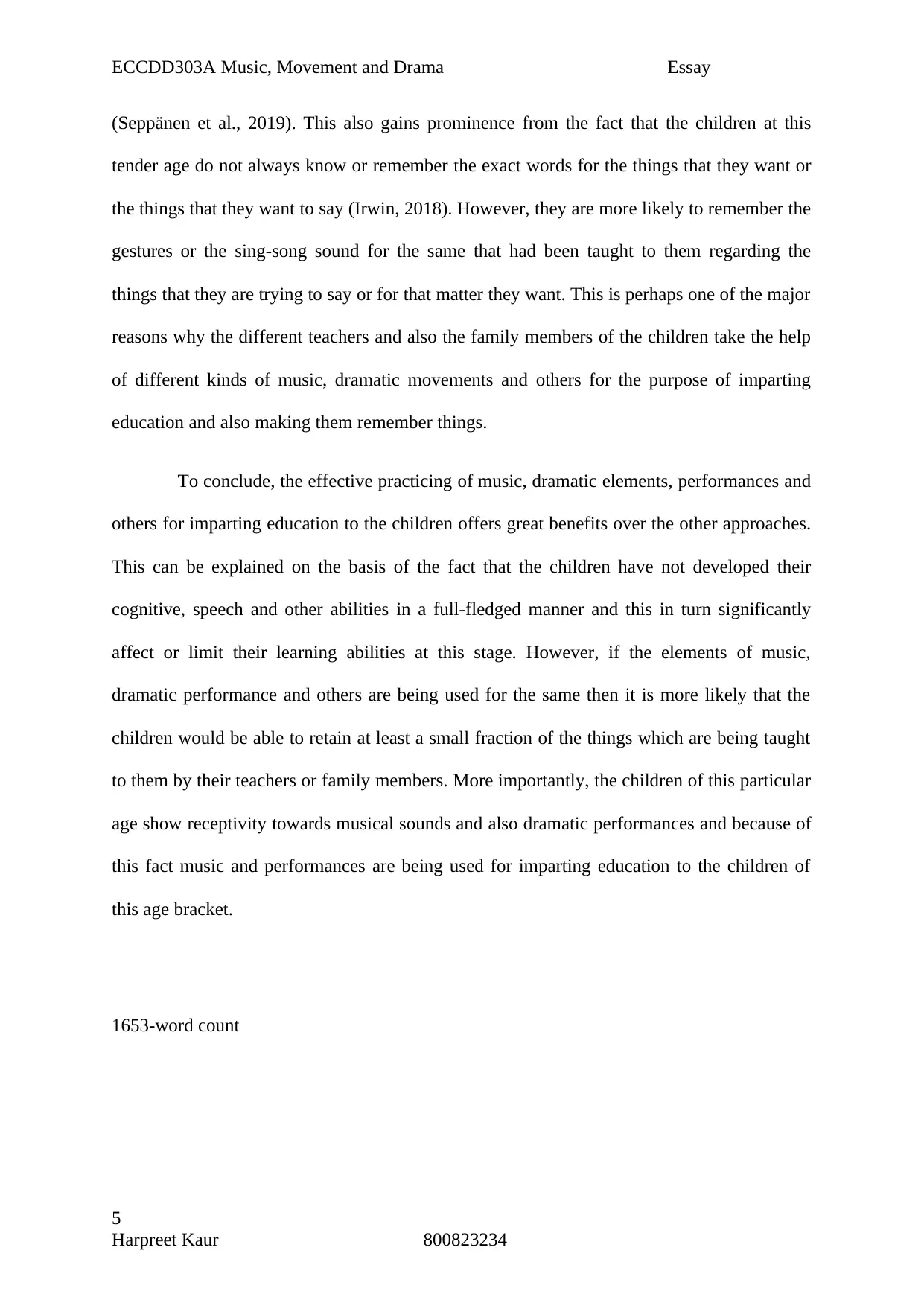
ECCDD303A Music, Movement and Drama Essay
(Seppänen et al., 2019). This also gains prominence from the fact that the children at this
tender age do not always know or remember the exact words for the things that they want or
the things that they want to say (Irwin, 2018). However, they are more likely to remember the
gestures or the sing-song sound for the same that had been taught to them regarding the
things that they are trying to say or for that matter they want. This is perhaps one of the major
reasons why the different teachers and also the family members of the children take the help
of different kinds of music, dramatic movements and others for the purpose of imparting
education and also making them remember things.
To conclude, the effective practicing of music, dramatic elements, performances and
others for imparting education to the children offers great benefits over the other approaches.
This can be explained on the basis of the fact that the children have not developed their
cognitive, speech and other abilities in a full-fledged manner and this in turn significantly
affect or limit their learning abilities at this stage. However, if the elements of music,
dramatic performance and others are being used for the same then it is more likely that the
children would be able to retain at least a small fraction of the things which are being taught
to them by their teachers or family members. More importantly, the children of this particular
age show receptivity towards musical sounds and also dramatic performances and because of
this fact music and performances are being used for imparting education to the children of
this age bracket.
1653-word count
5
Harpreet Kaur 800823234
(Seppänen et al., 2019). This also gains prominence from the fact that the children at this
tender age do not always know or remember the exact words for the things that they want or
the things that they want to say (Irwin, 2018). However, they are more likely to remember the
gestures or the sing-song sound for the same that had been taught to them regarding the
things that they are trying to say or for that matter they want. This is perhaps one of the major
reasons why the different teachers and also the family members of the children take the help
of different kinds of music, dramatic movements and others for the purpose of imparting
education and also making them remember things.
To conclude, the effective practicing of music, dramatic elements, performances and
others for imparting education to the children offers great benefits over the other approaches.
This can be explained on the basis of the fact that the children have not developed their
cognitive, speech and other abilities in a full-fledged manner and this in turn significantly
affect or limit their learning abilities at this stage. However, if the elements of music,
dramatic performance and others are being used for the same then it is more likely that the
children would be able to retain at least a small fraction of the things which are being taught
to them by their teachers or family members. More importantly, the children of this particular
age show receptivity towards musical sounds and also dramatic performances and because of
this fact music and performances are being used for imparting education to the children of
this age bracket.
1653-word count
5
Harpreet Kaur 800823234
⊘ This is a preview!⊘
Do you want full access?
Subscribe today to unlock all pages.

Trusted by 1+ million students worldwide
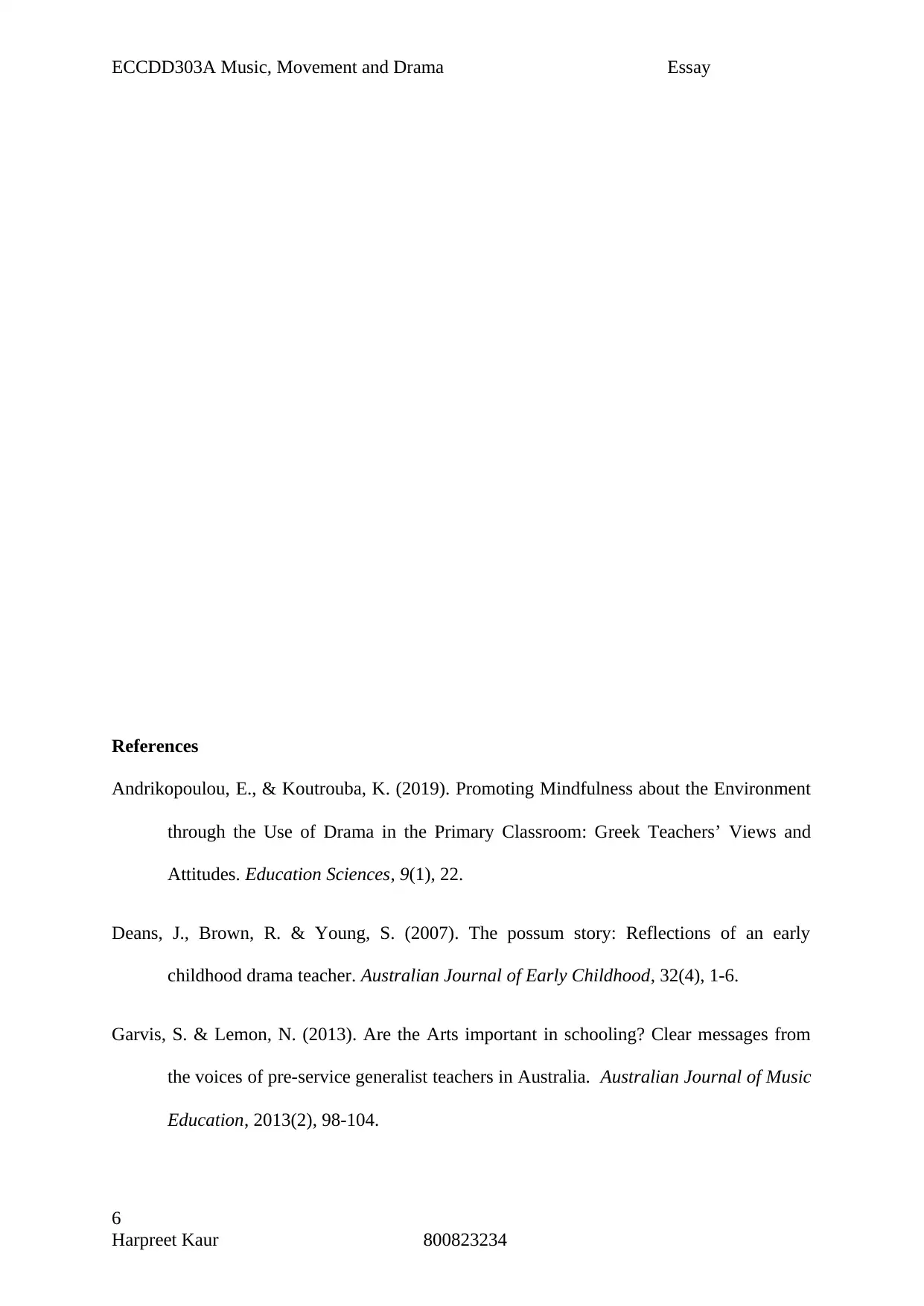
ECCDD303A Music, Movement and Drama Essay
References
Andrikopoulou, E., & Koutrouba, K. (2019). Promoting Mindfulness about the Environment
through the Use of Drama in the Primary Classroom: Greek Teachers’ Views and
Attitudes. Education Sciences, 9(1), 22.
Deans, J., Brown, R. & Young, S. (2007). The possum story: Reflections of an early
childhood drama teacher. Australian Journal of Early Childhood, 32(4), 1-6.
Garvis, S. & Lemon, N. (2013). Are the Arts important in schooling? Clear messages from
the voices of pre-service generalist teachers in Australia. Australian Journal of Music
Education, 2013(2), 98-104.
6
Harpreet Kaur 800823234
References
Andrikopoulou, E., & Koutrouba, K. (2019). Promoting Mindfulness about the Environment
through the Use of Drama in the Primary Classroom: Greek Teachers’ Views and
Attitudes. Education Sciences, 9(1), 22.
Deans, J., Brown, R. & Young, S. (2007). The possum story: Reflections of an early
childhood drama teacher. Australian Journal of Early Childhood, 32(4), 1-6.
Garvis, S. & Lemon, N. (2013). Are the Arts important in schooling? Clear messages from
the voices of pre-service generalist teachers in Australia. Australian Journal of Music
Education, 2013(2), 98-104.
6
Harpreet Kaur 800823234
Paraphrase This Document
Need a fresh take? Get an instant paraphrase of this document with our AI Paraphraser
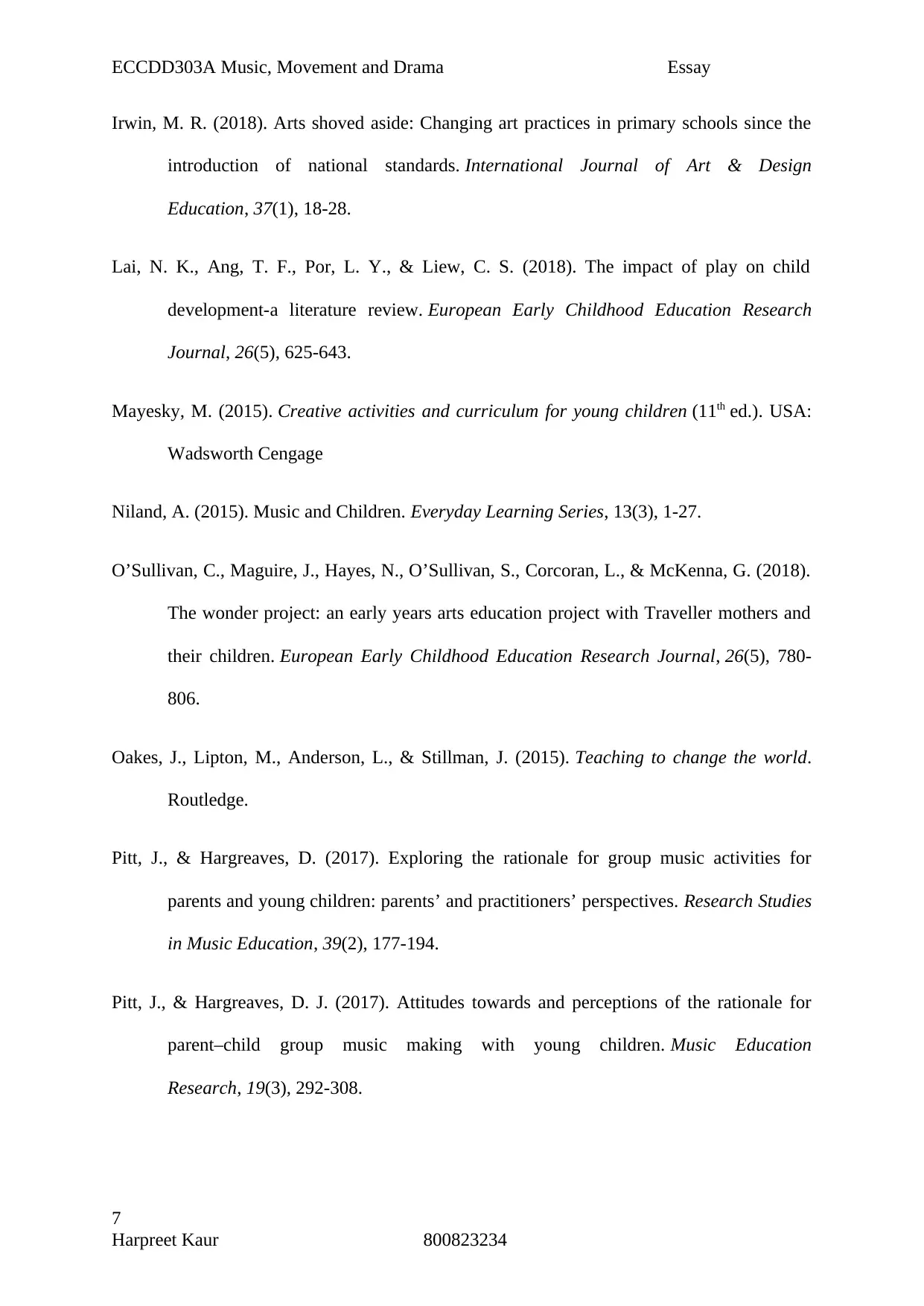
ECCDD303A Music, Movement and Drama Essay
Irwin, M. R. (2018). Arts shoved aside: Changing art practices in primary schools since the
introduction of national standards. International Journal of Art & Design
Education, 37(1), 18-28.
Lai, N. K., Ang, T. F., Por, L. Y., & Liew, C. S. (2018). The impact of play on child
development-a literature review. European Early Childhood Education Research
Journal, 26(5), 625-643.
Mayesky, M. (2015). Creative activities and curriculum for young children (11th ed.). USA:
Wadsworth Cengage
Niland, A. (2015). Music and Children. Everyday Learning Series, 13(3), 1-27.
O’Sullivan, C., Maguire, J., Hayes, N., O’Sullivan, S., Corcoran, L., & McKenna, G. (2018).
The wonder project: an early years arts education project with Traveller mothers and
their children. European Early Childhood Education Research Journal, 26(5), 780-
806.
Oakes, J., Lipton, M., Anderson, L., & Stillman, J. (2015). Teaching to change the world.
Routledge.
Pitt, J., & Hargreaves, D. (2017). Exploring the rationale for group music activities for
parents and young children: parents’ and practitioners’ perspectives. Research Studies
in Music Education, 39(2), 177-194.
Pitt, J., & Hargreaves, D. J. (2017). Attitudes towards and perceptions of the rationale for
parent–child group music making with young children. Music Education
Research, 19(3), 292-308.
7
Harpreet Kaur 800823234
Irwin, M. R. (2018). Arts shoved aside: Changing art practices in primary schools since the
introduction of national standards. International Journal of Art & Design
Education, 37(1), 18-28.
Lai, N. K., Ang, T. F., Por, L. Y., & Liew, C. S. (2018). The impact of play on child
development-a literature review. European Early Childhood Education Research
Journal, 26(5), 625-643.
Mayesky, M. (2015). Creative activities and curriculum for young children (11th ed.). USA:
Wadsworth Cengage
Niland, A. (2015). Music and Children. Everyday Learning Series, 13(3), 1-27.
O’Sullivan, C., Maguire, J., Hayes, N., O’Sullivan, S., Corcoran, L., & McKenna, G. (2018).
The wonder project: an early years arts education project with Traveller mothers and
their children. European Early Childhood Education Research Journal, 26(5), 780-
806.
Oakes, J., Lipton, M., Anderson, L., & Stillman, J. (2015). Teaching to change the world.
Routledge.
Pitt, J., & Hargreaves, D. (2017). Exploring the rationale for group music activities for
parents and young children: parents’ and practitioners’ perspectives. Research Studies
in Music Education, 39(2), 177-194.
Pitt, J., & Hargreaves, D. J. (2017). Attitudes towards and perceptions of the rationale for
parent–child group music making with young children. Music Education
Research, 19(3), 292-308.
7
Harpreet Kaur 800823234
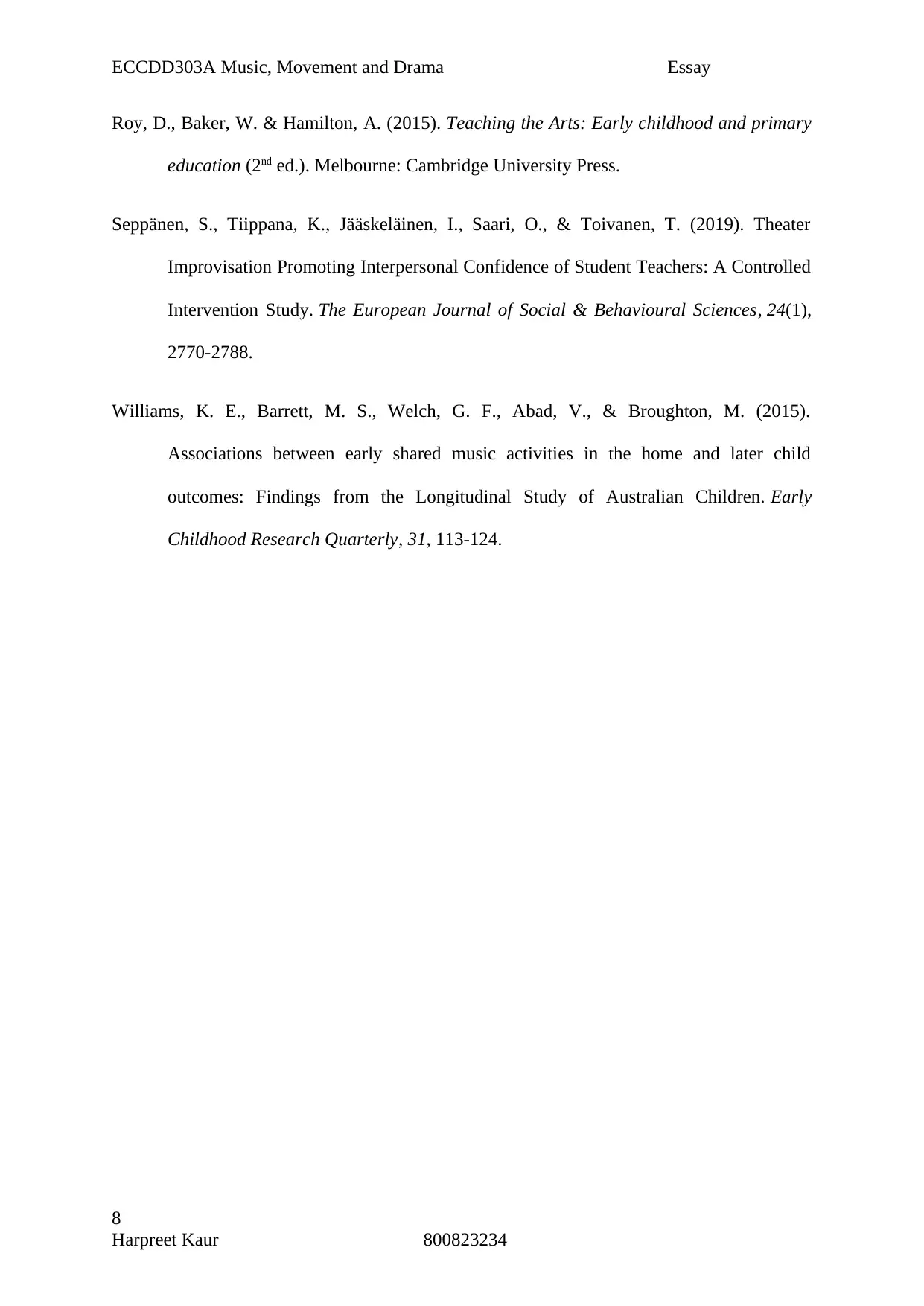
ECCDD303A Music, Movement and Drama Essay
Roy, D., Baker, W. & Hamilton, A. (2015). Teaching the Arts: Early childhood and primary
education (2nd ed.). Melbourne: Cambridge University Press.
Seppänen, S., Tiippana, K., Jääskeläinen, I., Saari, O., & Toivanen, T. (2019). Theater
Improvisation Promoting Interpersonal Confidence of Student Teachers: A Controlled
Intervention Study. The European Journal of Social & Behavioural Sciences, 24(1),
2770-2788.
Williams, K. E., Barrett, M. S., Welch, G. F., Abad, V., & Broughton, M. (2015).
Associations between early shared music activities in the home and later child
outcomes: Findings from the Longitudinal Study of Australian Children. Early
Childhood Research Quarterly, 31, 113-124.
8
Harpreet Kaur 800823234
Roy, D., Baker, W. & Hamilton, A. (2015). Teaching the Arts: Early childhood and primary
education (2nd ed.). Melbourne: Cambridge University Press.
Seppänen, S., Tiippana, K., Jääskeläinen, I., Saari, O., & Toivanen, T. (2019). Theater
Improvisation Promoting Interpersonal Confidence of Student Teachers: A Controlled
Intervention Study. The European Journal of Social & Behavioural Sciences, 24(1),
2770-2788.
Williams, K. E., Barrett, M. S., Welch, G. F., Abad, V., & Broughton, M. (2015).
Associations between early shared music activities in the home and later child
outcomes: Findings from the Longitudinal Study of Australian Children. Early
Childhood Research Quarterly, 31, 113-124.
8
Harpreet Kaur 800823234
⊘ This is a preview!⊘
Do you want full access?
Subscribe today to unlock all pages.

Trusted by 1+ million students worldwide
1 out of 9
Related Documents
Your All-in-One AI-Powered Toolkit for Academic Success.
+13062052269
info@desklib.com
Available 24*7 on WhatsApp / Email
![[object Object]](/_next/static/media/star-bottom.7253800d.svg)
Unlock your academic potential
Copyright © 2020–2026 A2Z Services. All Rights Reserved. Developed and managed by ZUCOL.





